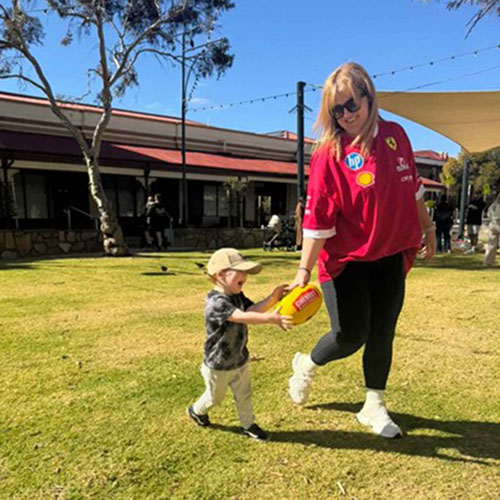
“I feel I can contribute more effectively in my role now, and it has also opened the door to future opportunities.”
Georgina said the flexibility and support she found at the University of Tasmania were essential for completing her master’s degree, as she balanced study with full-time work and raising a family.
When Georgina Seward began working in environmental health, she quickly realised her interests stretched far beyond her first degree. Starting her career in the mining industry, she gained valuable experience in environmental health and safety before moving into the health sector, where she balanced further study with work.
“I’ve always been a big advocate for not being afraid to try new industries or challenges, even while juggling family life,” Georgina said. “Each experience taught me something different and helped me grow both professionally and personally.”
After working in public health ‘surge teams’ that provide extra staff during times of high demand, such as during disease outbreaks, Georgina discovered a real passion for response and surveillance. That passion led her to study a Master of Public Health at the University of Tasmania.
“The course ticked all the boxes for me,” she said.
“It was practical, well-structured, and directly connected to real-world public health issues. The units in outbreak investigation and surveillance were particularly appealing. Plus, the flexibility to study while continuing to work in a rural setting was exactly what I needed.”

Based in Broken Hill, NSW, Georgina now works as a Surveillance Officer with the Far West Local Health District, focusing on strengthening systems that protect rural communities from health threats.
Georgina believes stronger surveillance and response systems, the smarter use of digital tools, and collaboration with employers, regulators, and community leaders are the key to building health systems that are not only responsive but sustainable and fair for everyone.
“One of the biggest challenges is ensuring equitable access to healthcare in rural and remote areas,” she said. “People often face delayed diagnoses and fewer opportunities for prevention, which leads to higher burdens of disease. Emerging public health threats, like infectious disease outbreaks or environmental exposures, only add to the challenge.”
“My study has strengthened both my knowledge and my confidence.”
Georgina said the flexibility and support she found at the University of Tasmania were essential for completing her master’s degree, as she balanced study with full-time work and raising a family.
“The biggest surprise was how manageable the course was alongside work and family life,” she said. “The support I received made it possible to succeed, even when things were busy. I also loved that everything I studied was so relevant. I could immediately apply it to my work, which kept me motivated.”
Self-funding her degree made Georgina determined to get the most out of every subject, and she says the investment has already paid off.
“I feel I can contribute more effectively in my role now, and it has also opened the door to future opportunities. The course gave me not only the tools I needed, but also the professional credibility to make a real impact in public health.”
Story courtesy of University of Tasmania

Find out more
Explore careers in public health through the University of Tasmania. These programs equip you with practical skills in health promotion, epidemiology, and policy development. Gain real-world experience through community-based projects and research opportunities addressing health challenges in Tasmania and beyond. Discover pathways into roles that improve population health and shape healthier communities.
Even while you’re still in school, you can begin building your future through Work-based Learning (WBL), School-based Apprenticeships (ASbA), and VET qualifications. These programs give you hands-on experience and real-world skills to prepare for a successful career in public health.
